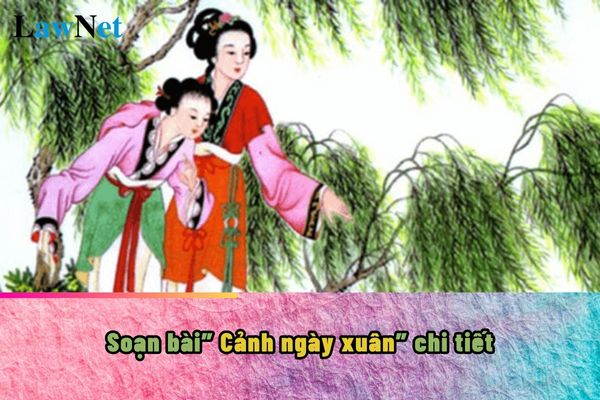What are guidelines on preparing the lesson "Cảnh ngày xuân" for students in Vietnam? What level is a grade 9 students in Vietnam?
What are guidelines on preparing the lesson "Cảnh ngày xuân" for students in Vietnam?
The "Cảnh ngày xuân" lesson is one of the texts that students will study in the grade 9 Literature curriculum.
Teachers and students can refer to the detailed preparation of the lesson "Cảnh ngày xuân" below:
|
Analysis of the excerpt "Cảnh ngày xuân" (Truyện Kiều) *Introduction |
Note: The information about the preparation of the "Cảnh ngày xuân" lesson is for reference purposes only./.
More articles:
Refer to: How to outline a creative storytelling essay for grade 5 students in Vietnam?
Refer to: How to outline a landscape essay in for grade 5 students in Vietnam?
Refer to: How to outline an essay describing a family member for students in Vietnam?
Refer to: 3 steps to outline a creative storytelling essay for students in Vietnam

What are guidelines on preparing the lesson "Cảnh ngày xuân" for students in Vietnam? What level is a grade 9 students in Vietnam? (Image from the Internet)
What level is a grade 9 students in Vietnam?
According to the provisions in Clause 1, Article 28 of the Education Law 2019:
Levels of Study and Ages of General Education
1. The levels of study and ages of general education are regulated as follows:
a) Primary education is conducted over 5 years, from grade one to the end of grade five. The age of students entering grade one is 6 years old and calculated based on the year;
b) Lower secondary education is conducted over 4 years, from grade six to the end of grade nine. Students entering grade six must have completed primary education. The age of students entering grade six is 11 years old and calculated based on the year;
c) Upper secondary education is conducted over 3 years, from grade ten to the end of grade twelve. Students entering grade ten must have a lower secondary education diploma. The age of students entering grade ten is 15 years old and calculated based on the year.
Based on the above regulations, lower secondary education is conducted over 4 years, from grade 6 to the end of grade 9.
Thus, grade 9 students belong to the lower secondary education level.
What 7 things are prohibited for grade 9 students in Vietnam?
Based on Article 37 of the regulations for lower secondary schools, upper secondary schools, and schools with multiple educational levels issued under Circular 32/2020/TT-BGDDT as follows:
[1] Offend the dignity and honor, infringe on the body of teachers, staff, school personnel, others, and other students.
[2] Cheat in studying, testing, examinations, and admissions.
[3] Buy and sell, use alcohol, beer, tobacco, addictive substances, other stimulants, fireworks, and flammable substances.
[4] Use mobile phones and other devices during class unless approved by the teacher for learning purposes.
[5] Engage in fighting, disorderly conduct, and security disturbances in school and public places.
[6] Use or exchange cultural products with violent or pornographic content; use or play games that are detrimental to one's healthy development.
[7] Students must not violate other legally prohibited actions.

